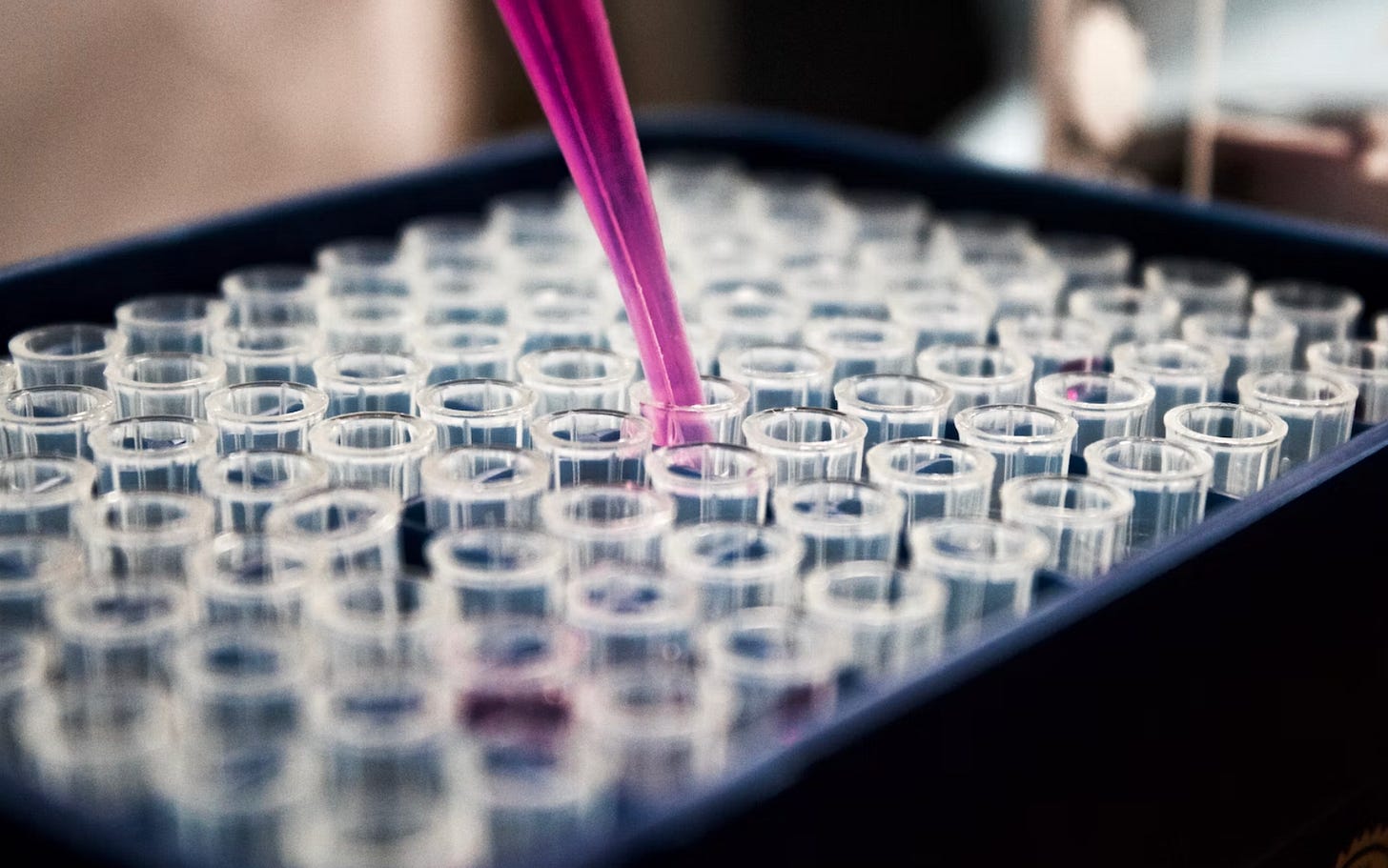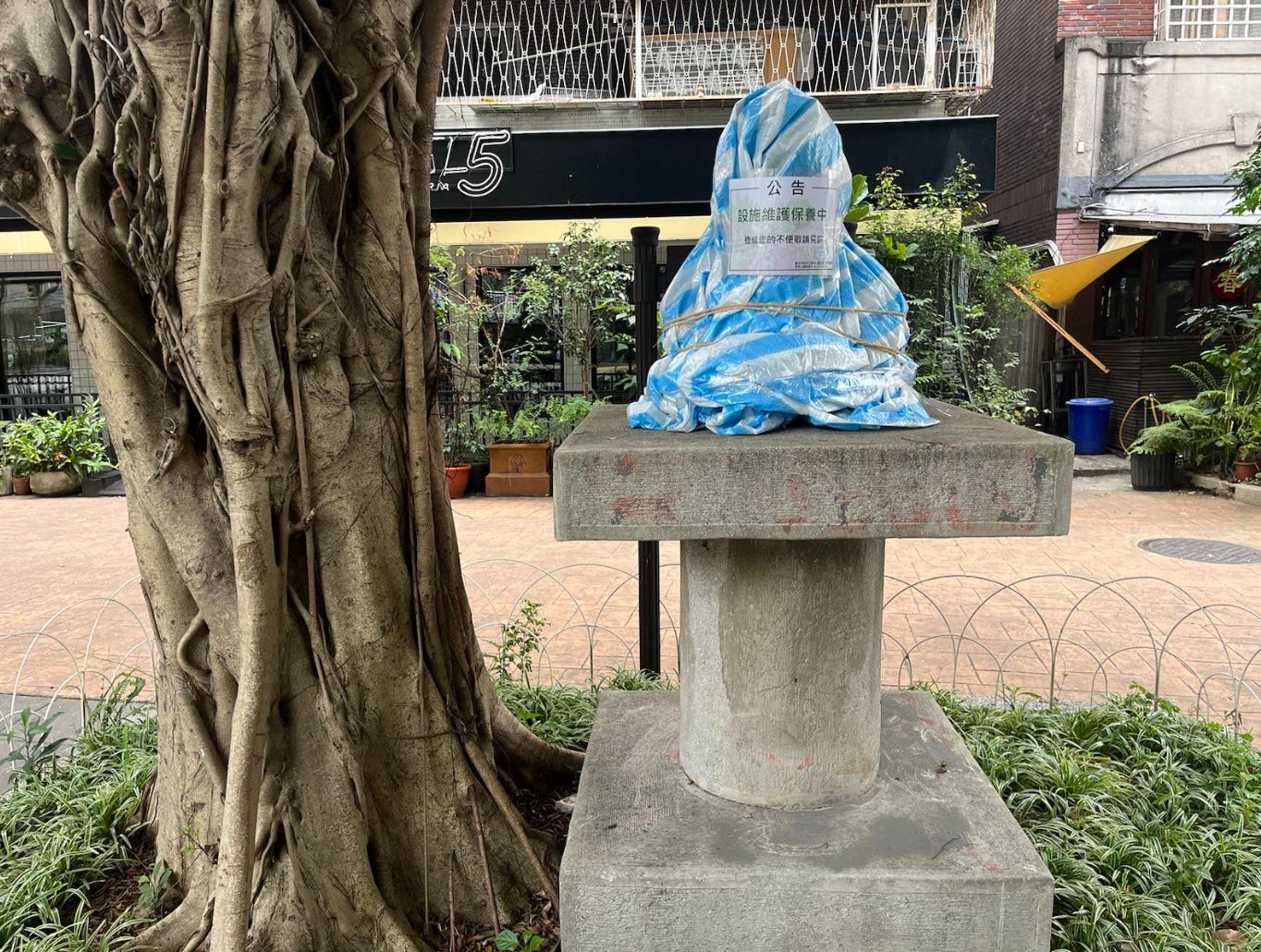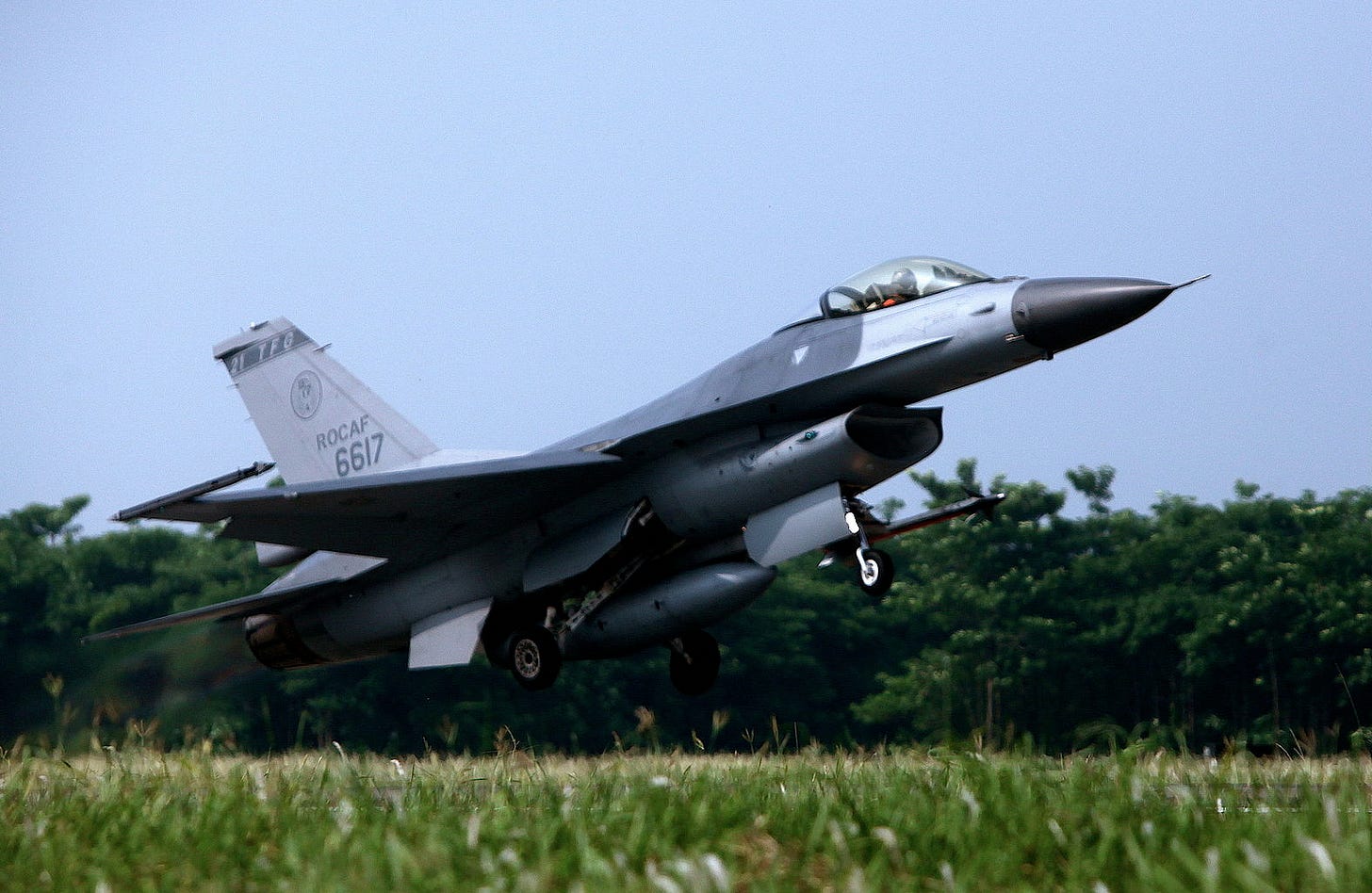A non-China Story ChinaDiction #83
The lab leak theory is back and we should pause and reflect, if Covid-19 spilled from a lab, is that China's fault?
Chinese recalcitrance aside, the origins of SARS-CoV-2 should be a scientific debate, not a political. Photo: Louis Reed; Unsplash.
I’m just going to start with a Vanity Fair punchy lead from this week because it’s good and Vanity Fair has more resources than I do:
On Tuesday, FBI director Christopher Wray publicly acknowledged that the Bureau considers an accidental biohazard leak from a laboratory in China to be the likeliest cause of the COVID-19 pandemic. The assessment had been made in August 2021, as part of an intelligence review ordered by President Biden. In an interview that aired on Fox News yesterday, Wray broke his silence on the matter, saying, ‘The FBI has for quite some time now assessed that the origins of the pandemic are most likely a potential lab incident in Wuhan.’
OK. This is plausible. It’s taken us three years to get here, but the absence of a better alternative theory to a lab leak is segueing into a lurching rewrite of the “natural origins,” out-of-the-market narrative.
In short, What if it’s our fault?
The “our” is important. Lost in the mix whenever Covid origins come up is that this lab leak could have happened anywhere. For China, it unfortunately happened in Wuhan and China, as we all know, reflexively buries bad news. In this case, it was probably burying what was globally bad news.
On this count – lack of transparency – China is to blame, but the leak itself could have happened in any bio-secure lab carrying out gain-of-function research into novel pathogens harvested from bats, or other animals.
When a US moratorium on gain-of-function ended, The Harvard School of Public Health wrote in January 2018:
The U.S. government lifted a three-year moratorium on funding risky research to genetically alter deadly viruses in ways that could make them even more lethal. Epidemiologist Marc Lipsitch of Harvard Chan School thinks the move could create an accidental pandemic.
Lipsitch said he worried …
… that human error could lead to the accidental release of a virus that has been enhanced in the lab so that it is more deadly or more contagious than it already is. There have already been accidents involving pathogens. For example, in 2014, dozens of workers at a U.S. Centers for Disease Control and Prevention lab were accidentally exposed to anthrax that was improperly handled. Another accident like that—if it involved a virus that was both newly created and highly contagious—has the potential to jeopardize millions of people.
Such leaks are not as unusual as many people suppose. Taiwan fessed up to a lab leak of SARS-CoV-2 in an incident involving a lab worker being bitten twice by mice, though whether the worker caught Covid-19 from the mice was undetermined at the time – only that the work left the lab carrying the virus.
Skeptics need only to skip over to the Wikipedia List of laboratory biosecurity incidents for an insight into just how common bio-secure accidents are.
To cut back to the Wuhan Institute of Virology (WIV), as Forbes notes:
WIV was not only the foremost lab in China doing work on SARS-like viruses, but they also claimed previously that they intended to do gain-of-function work to make these viruses more pathogenic.
This startling fact emerged when a 2018 grant proposal by EcoHealth Alliance, a US-based nonprofit that was working with WIV, was leaked to the press in 2021. Even though that proposal was never funded, the text describes how EcoHealth would genetically engineer new viruses, taking the spike protein from one bat coronavirus and inserting it into a different one, and then infecting mice to see what happens.
Back to Vanity Fair, which cuts to the quick of the problem.
For months, Democrats in Congress have declined to pursue a bipartisan inquiry into COVID-19’s origins, and the Biden administration did not press to include a plan for a bipartisan commission that would have examined the question in the last spending bill. Their hesitation was perhaps understandable, given the vehemence with which Republicans have pursued an openly partisan campaign to lay the blame for the pandemic at the feet of Dr. Anthony Fauci, the recently retired head of the National Institute of Allergy and Infectious Diseases.
As the National Review puts it:
We will probably never know for sure whether the SARS-CoV-2 virus is the product of the WIV lab because the Chinese government will not share the data. The U.S. intelligence community remains split on the question. The FBI and now the DOE favor a lab-leak origin, four other unnamed agencies and a national intelligence panel still assess with “low confidence” that natural transmission was the source, and two other agencies (the CIA and an unnamed agency) remain undecided.
But we are getting a pretty good idea of why the U.S. scientific community and its media enablers might have been so keen on suppressing the possibility of a lab-leak origin. Chinese researchers were conducting gain-of-function research as “part of an active and highly collaborative US–China scientific research program funded by the US Government.” The NIH’s National Institute of Allergy and Infectious Diseases, headed by Fauci, has been funding the EcoHealth Alliance since 2014, with annual grants through 2020 for “Understanding the Risk of Bat Coronavirus Emergence” totaling $3,748,715. The principal investigator was EcoHealth Alliance president Peter Daszak, and he directed the money to the WIV and other Chinese researchers.
It’s important for us to know whether the pandemic of the past three years was caused by a lab leak, not so that we can find further reason to rail against the Chinese system, but because we need a bipartisan, scientific debate on the value vs risks proposition of pushing viruses to their limits to see what happens next.
China is not alone in carrying out such research – and as noted above – it was doing it with US support. If this was a lab leak, it’s gain of function research that’s the culprit, not China.
If only China itself could get that …
CNBC:
China’s CCP warns Elon Musk against sharing Wuhan lab leak report.
Oh, Beijing, have you never heard of the Streisand effect?
What’s in a plenum?
The 2018 National People’s Congress. Photo: WikiCommons.
The second plenum has just wrapped up, and while ChinaDiction generally glosses over the minutiae of Beijing politics, this one is interesting as Radio Free Asia (RFA) notes in a commentary.
It promises some restructuring that will give the CPC even more control over government, which obviously China needs.
While officials have yet to make public the exact details of the restructuring, Japan-based China commentator Hong Xiangnan said the plans will likely include bringing the ministry for public security, which governs the police system, and the ministry for state security, which governs the state security apparatus and overseas intelligence operations, under the aegis of the party.
‘The only way this will go is the strengthening of the party at the expense of the state,’ Hong said. ‘It will turn government departments into administrative offices, tasked with running errands and doing the gruntwork.’
If this leaves you intrigued and you want to learn more, Neican has all the details, including explanations of the “Three Better Coordinations," the "Two Upholds," and the "Four Consciousnesses," among other numbered ideological pin-holds.
(And, btw, follow @PM_Thornton; she’s a great China source.)
The decisions made at the plenum are due to be approved during the annual meeting of the National People’s Congress (NPC), starting March 5 and running for around two weeks, in what is known as the Two Sessions because the Chinese People’s Political Consultative Conference (CPPCC) also holds its annual meeting at the same time.
If the above fascinates you, consider becoming a professional China watcher.
And in the US, a committee meeting …
The committee in question is formally known as the the House of Representatives Select Committee on the Strategic Competition Between the United States and the Chinese Communist Party (CCP) and, as its chairman put it at the opening of the session, reports Al Jazeera, it’s not a “polite tennis match”:
‘This is not a polite tennis match. This is an existential struggle over what life will look like in the 21st century — and the most fundamental freedoms are at stake,’ said Mike Gallagher, the committee’s Republican chairperson, as he opened the hearing.
Some Washington DC watchers joke that regarding China as an “existential threat” is about the only thing that has bipartisan support these days.
It’s a “joke” backed by actual numbers.
The committee has strong support across the House and the vote to create it was bipartisan, 365-65.
The meeting this week was the committee’s first and it’s expected to put further pressure on President Joe Biden to get tough on China.
A brood of China hawks were present, as were some Chinese dissident voices, such as Tong Yi – now a naturalized US citizen – who served time in detention and in a labor camp for “disturbing social order” – interpreting for Chinese Democracy Wall dissident Wei Jingsheng in the 1990s.
‘In the US, we need to face the fact that we have helped feed the baby dragon of the CCP until it has grown into what it now is,’ she said.
She means, you created a monster and now you have deal with it.
Protestors attended the event with banners proclaiming “China is not a threat,” but presumably none of them has lived in Tibet, Xinjiang, Hong Kong, Taiwan, Cambodia, Laos, Bhutan, Ladakh (almost anywhere in northern India) or recently in Ukraine.
Stop partying, bankers warned
Bank of China employees taking a break from counting money. Photo: Thibault Trillet, Pexels.
Ahead of the Two Sessions (see the Plenum story above) China’s top anti-graft body issued a 3,500-word tract that included a stern warning to bankers that it’s time to give up their “hedonistic” ways, “rectify their mindsets” and to stop “copying” Western lifestyles, reports Bloomberg (paywall).
You might be wondering, Don’t they even get to loosen their ties on a Friday night? And the answer to that is, No, not as far as CPC General Secretary Xi Jinping is concerned:
As the National People’s Congress kicks off this weekend, Xi is poised to further entrench control by reviving a powerful committee to coordinate economic and financial policy and installing close allies to oversee it all.
That comes on the heels of the sudden disappearance of one of China’s top investment bankers and follows the downfall of dozens of officials over the past 18 months in the most sweeping corruption crackdown on the financial sector ever. In its warning last week, China’s Central Commission for Discipline Inspection said bankers should abandon pretensions of being the “financial elite.”
The National People’s Congress — where top leaders will assess the government’s past performance and outline policies for the year ahead — offers Xi his first opportunity to shake up state institutions since he secured a precedent-breaking third term at the party’s twice-a-decade congress.
After all, Xi – who’s clearly not a confidence-builder by nature – has been shaking everything up since he came to power a decade ago.
Now it’s time for the financial sector.
Lukaschenko in Beijing
Belarus President Aleksandr Lukashenko. Photo: WikiCommons.
Kindred authoritarians Xi Jinping and Belarusian Alexander Lukashenko – two of Putin’s biggest supporters – met in Beijing on Wednesday, vowing to deepen defense and security ties and sharing views on the war in Ukraine, reports CNN.
Basically, no surprises.
Lukashenko endorsed China’s recent position on a ‘political solution’ to the conflict, according to a Chinese Foreign Ministry readout of the meeting, referring to a statement released by Beijing last week which called for peace talks to end the conflict, but did not push for a Russian withdrawal from Ukraine – drawing skepticism from Western leaders.
Both Xi and Lukashenko expressed “deep concern over the prolonged armed conflict” and looked forward to an “early return to peace in Ukraine,” according to a joint statement following their sit down in the Great Hall of the People, where Xi greeted Lukashenko in a ceremony alongside a phalanx of Chinese troops.
Reuters reports that the talks culminated in numerous agreements, building on an “all weather” partnership forged between China and Belarus last year.
Grounded
Air China Boeing 747-400. Photo: Duan Zhu; WikiCommons.
The Financial Times reports that despite all the feel-good headlines about things getting back to normal, China’s aviation sector remains firmly bogged in a low-demand quagmire.
The number of passengers taking foreign trips with the country’s three main airlines last month was 10 per cent of pre-pandemic levels four years earlier, according to aviation consultancy Cirium.
Despite Beijing abandoning its strict zero-Covid policies at the end of last year, flights in and out of mainland China are limited, airfares remain elevated and Beijing has been reluctant to grant new tourist visas to foreigners. Covid tests for travellers from China to countries around the world are still common and acting as a deterrent to flying.
The ‘Big Three’ — Air China, the country’s flag carrier, China Eastern and China Southern — have all issued profit warnings in recent weeks and were weighed down with combined record losses of more than Rmb100bn ($14.4bn) forecast for 2022.
Easy prediction: Whatever China may be saying, “normality,” is not on the doorstep – regardless of what doorstep you’re standing on, what business sector you’re surveying – and expect less normality to come.
The Greater Sinosphere
Hong Kong
Exports plunge
Occasionally a business update jumps off the page, and such is the case with Hong Kong’s latest export numbers, which reveal they plunged by “the most in 70 years” in January, according to Bloomberg.
Overseas shipments plummeted 36.7% from a year earlier to HK$290.9 billion ($37.1 billion), the Census and Statistics Department said Monday. That was the lowest amount since February 2020 and was far worse than an expectation of a 27.6% fall in a Bloomberg survey of economists. The drop was the largest since September 1953.
‘Exports to all major markets fell by varying degrees,’ a government spokesman said in a release accompanying the data. An early Lunar New Year holiday may also have affected trade, he added.
Declines were recorded across Asia, with exports to Japan down 50%, those to Singapore down 45.2%, and shipments to Taiwan and Vietnam down more than 40% each. Exports to mainland China dropped nearly 44%.
Some economists reportedly responded that the declines were as expected, warning that other trade-reliant economies face challenges due to a global demand slowdown.
Kowloon-side tower burns through the night
The Kimpton Hong Kong, a 42-story hotel redevelopment being constructed in Kowloon-side tourist district of Tsim Sha Tsui, burned through the night before the fire was brought under control this morning in an effort involving some 250 firefighters.
Some neighboring buildings also caught fire – including the infamous Chung King Mansions, but no casualties have been reported.
Taiwan
China’s first invasion …
A bust of Chiang Kai-shek in Taipei’s Yongkang Park is covered for protection during the anniversary of 228. Photo: Michael Fahey.
A covered statue of Chiang Kai-shek (Jiǎng Jièshí, 蒋介石) in a quiet corner of a wealthy Taipei neighborhood bears a sign stating that the statue is “under maintenance.”
It’s a necessary precaution against vandalization at the end of February each year. Popular options including dumping red paint on the statue or writing the words “Main Offender” (yuánxiōng, 元凶) in white paint.
Meanwhile, in another part of town, Focus Taiwan reports that young protestors “rushed” Taipei’s new mayor Chiang’s great-grandson Chiang Wan-an (Jiǎng Wàn'ān, 蔣萬安), demanding an apology for the February 28 incident (of 1947) – better known in Taiwan as the 228 massacre, or simply 228 (二二八 èr èr bā) when nationalist troops killed thousands after Taiwanese revolted against KMT rule.
Despite a heavy police presence, a number of people managed to break the cordon at the 228 Peace Memorial Park to protest against Chiang, about three meters away from the podium where the mayor had just begun delivering his remarks.
According to the Taipei Times, Chiang continued his speech and said:
‘As Taipei mayor, I give my sincere apology about the cigarette confiscation incident that occurred in front of the Tianma Tea House (天馬茶房) in Taipei’s Dadaocheng (大稻埕) area 76 years ago, which led to the historical pain of the 228 Incident across the nation.’
In same speech, Chiang said that the truth must be restored, wounds healed, and a peaceful settlement reached by [Taiwanese] society.
Down in the southern historical capital Tainan, President Tsai Ying-wen (Cài Yīngwén, 蔡英文) delivered historically detailed remarks focused on legislation for and administration of transitional justice during her two terms now drawing to a close. She mentioned that a national action plan for transitional justice education had been approved. In other words, there will be more teaching about 228 and Taiwan’s authoritarian past.
While many in Taiwan would probably prefer that 228 just go away, the statue in Yongkang Park will need to be covered up each spring for many years to come until the burghers of Taipei finally give up and remove it.
Perhaps the most fitting symbol of 228 in contemporary Taiwanese society is the recent release of a digitally-refurbished version of the classic 228 movie A City of Sadness, originally released in 1989. There doesn’t seem to be much new that can be said about 228, but it flashes before the eyes each year in ever more precise detail, an annual nightmare that continues to disturb Taiwan’s sleep even if quickly forgotten again.
This year has seen some unusually extensive English-language coverage of the meaning of the 228 incident in Taiwan, notably by Chris Horton in the China Project.
Michael Fahey in Taipei and Chris Taylor in Bangkok.
US approves more munitions sales
A F-16 taking to flight in Taiwan. Photo: Al Jazeera English; WikiCommons.
The US has approved sale of $619 million in new weapons to Taiwan, including missiles for its F-16 fleet, reports the The Associated Press.
The State Department said in a statement Wednesday night it had approved sales of missiles to be used with the F-16s as well as equipment to support the missiles. That includes AGM-88 anti-radiation missiles, as well as air-to-air missiles and launchers.
Taiwan yesterday reported a second day of large-scale Chinese air force incursions into its air defense identification zone (ADIZ), according to multiple sources.
In January, reports VOA, China said it staged combat drills around the island to “resolutely counter the provocative actions of external forces and Taiwan independence separatist forces.”
Obviously, China “firmly opposes” all military sales to Taiwan, but they will continue for as long as China persists in buzzing Taiwan with its jets and threatening to invade.
Japanese press report riles Taiwan
The Taipei Times reports that the Ministry of Foreign Affairs has called on Japan’s Nikkei Shimbun to “seriously clarify” a report that “up to 90 percent” of Taiwan’s military retirees have collaborated with China for money.
The report on Tuesday said that up to 90 percent of military retirees have spent time in China, where they provided information to Beijing in exchange for money.
Citing an unnamed source, the report attributed the issue to the top ranks of the military being dominated by people with family lineages in China, saying that the government is not aware of the “true face” of the situation.
It is indeed a “bold” claim by the Nikkei Shimbun and it would seem unlikely that the newspaper can back it up.
The article was ‘fabricated out of thin air,’ and the newspaper used ‘sensational headlines to slander the integrity of national army officers and soldiers, and dividing troops,’ the Ministry of National Defense said in a statement on Wednesday.
Coda
Lawyering ain’t what it used to be in Shanghai
Oh, for the good old days, when a year or two of excitement working as lawyer in Shanghai required, among other things, horsemanship …













